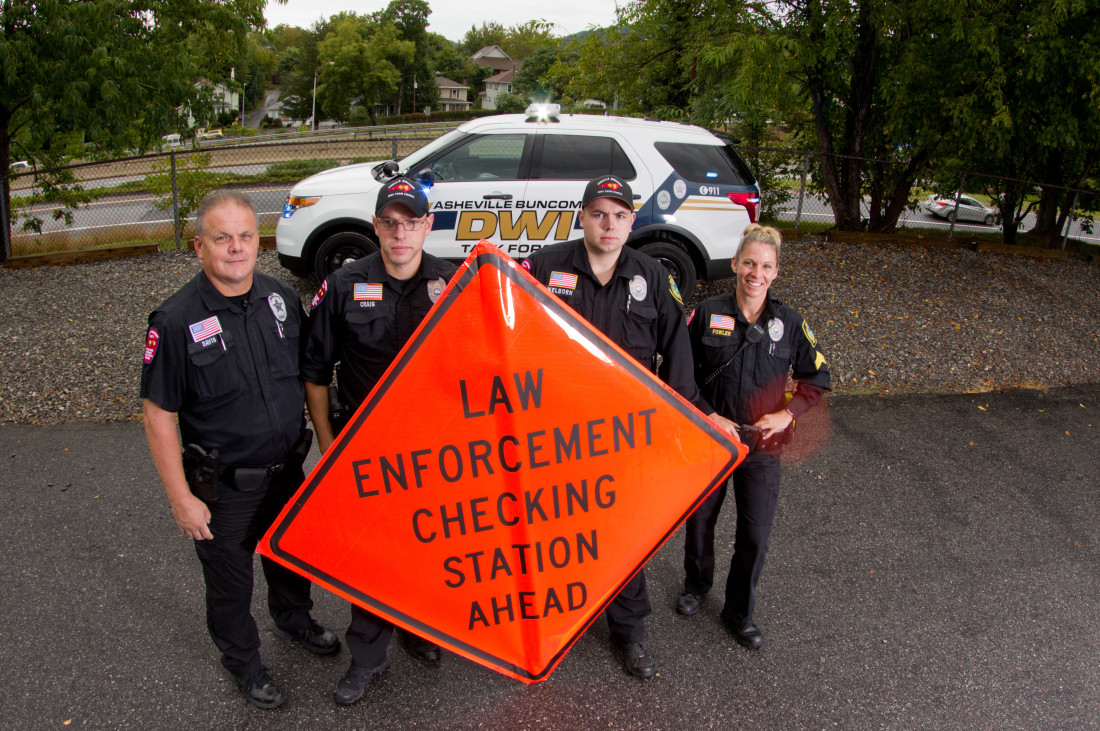Beginning with an 1876 adventure novel, Asheville gained the nickname Land of the Sky. In recent years, a new moniker has taken hold, encompassing both the lively spirit of the mountain city and a burgeoning industry: Beer City USA. Asheville first earned the title in 2009, and its hopping brewery scene has even picked up since then. But with this intoxicating growth sprouted sobering realities.
Along with more breweries came more drunken drivers — at least initially. But while beer is booming, incidents of driving while intoxicated have actually decreased over the past several years. In 2011, Buncombe County reached a peak percentage of fatal crashes on its highways involving alcohol at 36 percent.
To curb the deadly trend, in 2013 the Asheville Police Department and the Buncombe County Sheriff’s Office founded a joint DWI Task Force. Its members are trained to identify different types of substance abuse and thereby more accurately assess a person suspected of driving while impaired. They also run roadblocks and respond to collisions where drugs and alcohol are suspected to have been involved.
“It started because we found that we were having a lot of fatal collisions with impaired drivers,” says Sgt. Ann Fowler, who has been in charge of the task force since 2014. “We were also seeing the effects of impaired driving, not only with fatals, but with serious injuries and property damage. Our numbers were starting to go up as far as arrests and violations, and our patrol was short-manned.”
In recent years, however, Buncombe County’s DWI arrest rate has dropped significantly, from 2,170 in 2007 to 1,489 in 2015. And while Fowler says the police force would love to take full credit, she notes myriad factors contributing to the safer streets. “We push education on alcohol impairment, and by society’s standards, it is not acceptable anymore,” she says. “And now there are more opportunities for people to get a ride: There’s Uber, you’ve got taxis, we’ve got our transit system, and our community has become very walkable.” Now with ride-sharing services like Lyft and Uber, one can conceivably hitch a ride home for the cost of a pint.
Another possible explanation for a declining DWI rate could be that a beer-loving city lays off the hard stuff and drinks more moderately than a liquor-guzzling bastion of decadence.
“For us, it is really about quality, not quantity,” says Kendra Penland of the Asheville Brewers Alliance, which represents 56 breweries in Western North Carolina. The ABA partners with Alcohol Law Enforcement and the Alcoholic Beverage Control commission to help educate bartenders and servers about responsible serving. It also works with Sobriety Court, which is credited with assisting in the dramatic decrease of habitual impaired driver arrests — from 46 in 2007 to 16 in 2015.
“Craft beer is an artisanal product, so it’s not about how much you can drink, it’s about how local the ingredients are and how special that particular beer is. It’s not about how much we can sell to people,” Penland says. “Obviously, our businesses want to be successful, but if they were in it for the money, you’d see a very different craft beer community than we actually have.”
Fowler says the county is also seeing a shift in the type of intoxicants involved in DWIs. She estimates that last year more than 30 percent of DWI arrests were related to drug impairment, not alcohol. Several years ago, drugs made up only 15-20 percent of DWIs.
“Our drug impairment is starting to pick up in the last two years,” she says. “It has always been an issue, but we are starting to see a spike in the heroin trend. Our officers are becoming more educated on impairment outside of the alcohol impairment and being able to recognize it, so we are starting to get more arrests.”
Asheville City Council member Brian Haynes says some aspects of the DWI enforcement program rub him the wrong way. “I find it troubling that we have a massive promotion campaign to promote Asheville as Beer City USA, yet at the same time we have a substantial DWI Task Force whose job is to find and punish offenders,” he says. “If we are going to encourage and profit from consumption of alcoholic beverages, then we should do all we can to ensure folks get home safely without being charged with a DWI.”
Haynes thinks the city should partner with local breweries, distilleries, restaurants and bars to find ways to prevent DWIs rather than sending people into the criminal justice system. “These charges cause both a personal and financial hardship that lingers for years,” he says.






“Haynes thinks the city should…find ways to prevent DWIs rather than sending people into the criminal justice system.”
People are sent into the criminal justice system because those well-intended ways often FAIL, not because law enforcement is overzealous. Ten years of averaging 300 annual alcohol and drug-related CRASHES (almost one-a-day) is proof that an aggressive DWI Task Force is necessary.
Councilman Haynes, try caring more about the value of victim’s LIVES and less about a drunk driver’s privelage to drive. A truly “progressive” Asheville would value LIFE over booze, money or the reputation of “Beer City”.
On a lighter note, describing the duties of the DWI Task force as “…they also run roadblocks…” could have been worded better.